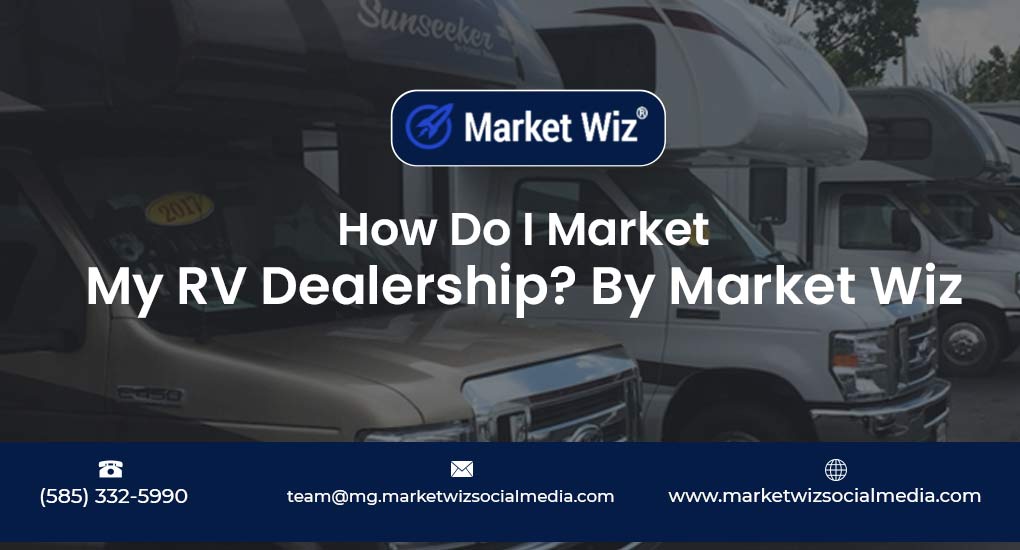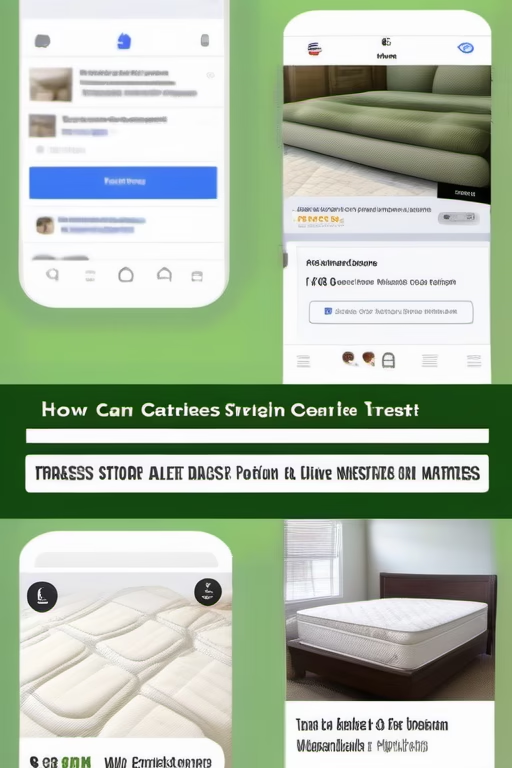The Best Online Platforms for Selling RVs in 2024
Your Comprehensive Guide by Market Wiz
Table of Contents
- Introduction: The Evolving RV Sales Market
-
Overview of Online Platforms
- Facebook Marketplace
- Craigslist
- RV-Specific Marketplaces
- General E-commerce Platforms
-
Benefits & Drawbacks of Each Platform
- Reach and Targeting
- Cost and ROI
- User Experience and Engagement
-
Optimizing Your Listings and Strategy
- Ad Copy and Visuals
- SEO and Keyword Integration
- Local Optimization Techniques
-
Complementary Organic Strategies
- Content Marketing
- Social Media Engagement
- Email Marketing
-
Analytics & Continuous Optimization
- Key Metrics
- Data-Driven Adjustments
- Case Studies & Success Stories
- Conclusion & Next Steps
- Frequently Asked Questions (FAQs)
- Additional Keywords for SEO & Content Strategy
Introduction: The Evolving RV Sales Market
The market for recreational vehicles (RVs) and campers is booming, driven by a surge in consumer interest in outdoor adventures and flexible travel. However, as competition intensifies, RV dealerships and sellers must continuously innovate their marketing strategies to stand out. In 2024, the landscape has shifted toward leveraging digital platforms that offer organic lead generation without the need for hefty paid advertising budgets.
This ultimate guide from Market Wiz explores the best online platforms for selling RVs in 2024. We’ll provide a detailed comparison of popular platforms, analyze their benefits and drawbacks, and share actionable strategies to optimize your listings for maximum impact. Whether you’re a niche RV dealer or a large-scale retailer, this guide will help you tap into the most effective channels to boost your sales.
Throughout this post, we will cover everything from foundational SEO principles and content marketing to advanced local optimization and analytics. Our goal is to empower you with the knowledge and tools needed to drive quality traffic and convert that traffic into leads—without relying on expensive paid ads.
Overview of Online Platforms
Facebook Marketplace
Facebook Marketplace is a free platform that enables sellers to list RVs and campers for sale. With advanced targeting options and a massive user base, it allows you to reach a diverse audience. The integration of social features makes it easier to build trust and interact with potential buyers.
Craigslist
Craigslist is known for its simplicity and local focus. It offers a low-cost way to post detailed listings and reach a localized audience. While it lacks advanced targeting and analytics, its broad reach in local communities makes it a valuable platform for RV sales.
RV-Specific Marketplaces
Several online platforms specialize in RV and camper sales. These marketplaces are designed specifically for recreational vehicles, offering targeted audiences and industry-specific tools that can help you showcase your inventory effectively.
General E-commerce Platforms
Platforms like eBay Motors, AutoTrader, and Craigslist’s automotive section allow you to reach a wider audience. While these platforms are not exclusively for RVs, they offer robust search features and a broad user base, which can drive significant traffic.
Benefits & Drawbacks of Each Platform
Reach and Targeting
Facebook Marketplace offers advanced targeting based on demographics and interests, while Craigslist reaches a more local and broad audience. RV-specific marketplaces attract buyers who are specifically interested in recreational vehicles.
Cost and ROI
Most of these platforms offer free or low-cost listing options. However, the return on investment depends on how well you optimize your listings and the quality of your audience. Paid options on some platforms can enhance visibility but may not always yield a proportionate ROI.
User Experience and Engagement
The interactive nature of Facebook Marketplace and specialized RV marketplaces often leads to higher engagement, whereas Craigslist relies on straightforward listings. The choice depends on your target audience and the level of interaction you desire.
Optimizing Your Strategy
Creating Compelling Listings
To maximize the effectiveness of any platform, your listings must be compelling and informative. Use high-quality images and videos that highlight the best features of your RVs. Write detailed descriptions that include key specifications, pricing, and unique selling points.
Keyword Integration and SEO Best Practices
Incorporate relevant keywords naturally into your listings and content. This helps improve your organic visibility when potential buyers search for RVs online. Focus on long-tail keywords that are specific to your inventory and location.
Targeting and Segmentation
Whether on Facebook, Craigslist, or specialized platforms, understanding your target audience is key. Segment your audience based on location, interests, and behavior. Tailor your messaging and offers to meet the specific needs of each segment.
Organic Strategies and Complementary Tactics
Leveraging Content Marketing
Beyond paid listings, content marketing is a powerful way to attract organic traffic. Create blog posts, guides, and videos that offer useful information about RV ownership, maintenance tips, and financing options. High-quality content not only improves SEO but also builds your brand as an authority in the RV market.
Social Media Engagement
Use social media channels to promote your listings and content. Engage with potential buyers by sharing success stories, customer testimonials, and behind-the-scenes content. This helps to build trust and drive additional traffic to your online platforms.
Retargeting and Follow-Up Campaigns
Implement retargeting strategies to re-engage visitors who have shown interest in your RVs but have not yet made a purchase. Automated follow-up emails and ads can keep your dealership top-of-mind and increase conversion rates.
Analytics and Continuous Optimization
Monitoring Performance Metrics
Use tools like Google Analytics and Search Console to track the performance of your online platforms. Monitor metrics such as organic traffic, click-through rates, and conversion rates to understand what’s working and where improvements are needed.
Data-Driven Adjustments
Regularly analyze your data and adjust your strategies accordingly. A/B testing different elements of your listings, ad copy, and content can help you optimize for better performance. Continuous optimization is key to staying ahead in a competitive market.
Case Studies & Success Stories
Real-world case studies provide compelling evidence of the success of organic lead generation strategies. One RV dealership, after optimizing its online listings and implementing a robust content marketing strategy, increased its organic leads by 70% in 2024.
Another dealer focused on local SEO and social media engagement, resulting in a 60% boost in website traffic and a significant improvement in conversion rates. These examples demonstrate that with the right strategies, RV dealerships can achieve remarkable growth without relying on expensive paid ads.
Conclusion & Next Steps
The future of RV dealership marketing lies in leveraging organic strategies to drive sustainable growth. By optimizing your website for SEO, creating engaging content, and effectively managing your local presence through platforms like Google My Business, you can generate high-quality leads and close more sales—without the high costs of paid advertising.
Begin by auditing your current digital assets and implementing the strategies outlined in this guide. Continuous monitoring, testing, and data-driven adjustments will help you stay competitive and achieve long-term success in 2024 and beyond.
For more expert insights and advanced digital marketing strategies, visit our Digital Marketing Insights section on Market Wiz. Embrace organic growth and watch your RV dealership thrive.
Frequently Asked Questions (FAQs)
1. What is organic SEO?
Organic SEO involves optimizing your website to rank higher in search results without using paid ads.
2. How can RV dealerships benefit from organic marketing?
Organic marketing builds long-term credibility, drives sustainable traffic, and generates quality leads at a lower cost.
3. What are the key components of on-page SEO?
They include keyword research, optimized meta tags, structured header tags, high-quality content, and image/video optimization.
4. Why is technical SEO important?
Technical SEO ensures your website loads quickly, is mobile-friendly, secure, and easily crawlable by search engines.
5. What is local SEO?
Local SEO focuses on optimizing your online presence to attract customers from your specific geographic area.
6. How do I optimize my Google My Business listing?
Claim and verify your listing, provide accurate business details, upload high-quality images, and post regular updates.
7. What are geo-targeted keywords?
These are keywords that include location-specific terms to help your business appear in local search queries.
8. How do customer reviews impact SEO?
Positive reviews build trust and improve your local search rankings, driving more organic leads.
9. What is link building?
Link building is the process of acquiring high-quality backlinks from reputable websites to boost your site's authority.
10. How can social media boost my organic traffic?
Social media increases brand awareness, drives traffic to your website, and supports your overall SEO efforts.
11. What are drip email campaigns?
Drip campaigns are automated email sequences that nurture leads over time with personalized content.
12. How does CRM integration help with lead management?
CRM integration automates follow-ups, tracks customer interactions, and streamlines your sales process, improving conversion rates.
13. What is predictive analytics?
Predictive analytics uses historical data to forecast customer behavior, allowing you to focus on high-potential leads.
14. Can video content improve my SEO?
Yes, engaging video content increases user engagement and dwell time, which can positively affect your search rankings.
15. Why is mobile optimization crucial?
A mobile-friendly website is essential as many users search on smartphones, impacting both user experience and SEO.
16. What is schema markup?
Schema markup is code that helps search engines understand your content, often resulting in enhanced search result listings.
17. How do local citations improve SEO?
Local citations, which are consistent mentions of your business across directories, improve your local search rankings.
18. How can I track my SEO performance?
Use tools like Google Analytics and Search Console to monitor organic traffic, keyword rankings, and conversions.
19. What are long-tail keywords?
Long-tail keywords are specific, detailed search phrases that attract highly targeted traffic with lower competition.
20. How do I build quality backlinks?
Focus on guest posting, outreach, and creating high-quality content that naturally earns backlinks from authoritative sites.
21. What role does Google My Business play in local SEO?
An optimized GMB listing boosts your local search visibility and drives targeted traffic from Google Maps.
22. How do automated follow-ups improve conversions?
They ensure timely, personalized communication with leads, significantly increasing the likelihood of conversion.
23. Can social media integration enhance my SEO efforts?
Yes, social media engagement drives additional traffic to your website and supports your overall digital marketing strategy.
24. What is the benefit of CRM integration?
CRM integration automates lead management, streamlines follow-ups, and helps convert leads more efficiently.
25. What are the next steps to boost lead generation?
Begin by auditing your digital presence, then implement the organic strategies outlined in this guide, and continuously optimize based on performance data.
Additional Keywords for SEO & Content Strategy
- RV dealership marketing
- RV lead generation
- organic RV sales
- SEO for RV dealers
- content marketing for RVs
- local SEO for RV dealerships
- digital marketing for RV sales
- inbound marketing for RVs
- organic traffic for RV dealers
- Google My Business RV
- RV keyword research
- on-page SEO for RVs
- mobile optimization for RV sites
- customer reviews RV dealerships
- local citations for RV dealers
- backlink building for RV sales
- social media for RV marketing
- organic lead nurturing RVs
- CRM integration for RV dealers
- drip email campaigns RV
- local search ranking RV dealerships
- digital presence for RV dealers
- SEO audits for RV sales
- organic marketing for RVs
- inbound SEO for RV dealers
Final Thoughts
In today’s digital landscape, RV dealerships can significantly boost their sales by embracing organic marketing strategies. By focusing on robust SEO practices, creating engaging and valuable content, optimizing your local presence through Google My Business, and effectively nurturing leads through automated follow-ups, you can drive sustainable growth and generate high-quality leads without the high cost of paid ads.
Start by auditing your current digital assets and implementing the strategies outlined in this guide. With continuous monitoring, testing, and data-driven optimization, your RV dealership can achieve top search rankings, attract more organic traffic, and ultimately close more sales.
For further expert insights and advanced digital marketing strategies, visit our Digital Marketing Insights section on Market Wiz. Embrace organic growth and watch your RV dealership thrive in 2024 and beyond.

















